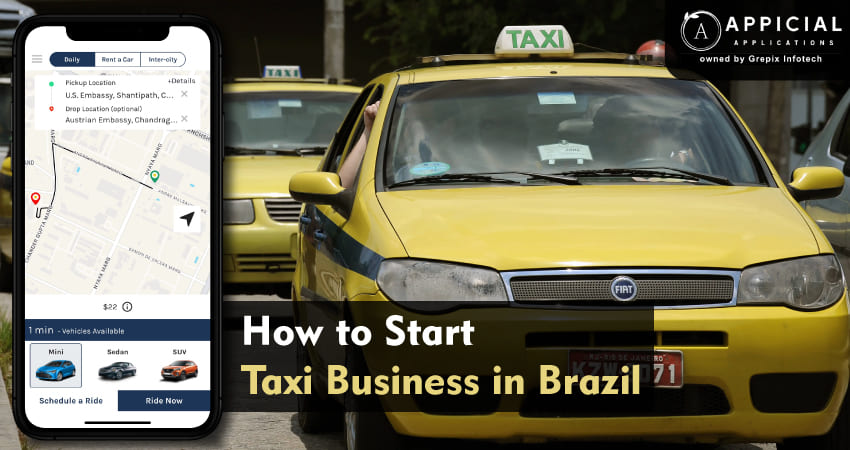
How to Start Taxi Business in Brazil
Starting a taxi business in Brazil can be a lucrative venture, given the country's bustling urban centers and a growing demand for reliable transportation services. The taxi booking industry has burgeoned into a significant enterprise in Brazil, emerging as a prevalent mode of transportation for many. The convenience of hailing a taxi to journey to any desired destination has led to a widespread reliance on taxi services by the public.
Amidst this growing demand, taxi booking companies are vying for market dominance by elevating the customer experience. Their goal is to not only meet but exceed passenger expectations through reliable, efficient, and user-friendly services. This focus on customer satisfaction is pivotal for growth, as it fosters loyalty and attracts new users in a competitive landscape. By prioritizing the needs and preferences of their clientele, these services aim to cement their position in the bustling Brazilian transportation sector, contributing to its evolution and their own business expansion.
However, navigating the process requires understanding local regulations, market dynamics, and strategic planning. In this blog, we’ll outline the essential steps and considerations for launching a successful taxi business in Brazil.
Launching a taxi business in Brazil offers a promising opportunity due to its large economy and demand for reliable transport. Success hinges on understanding legal requirements, conducting market research, and creating a detailed business plan. Financing, vehicle procurement, and embracing technology like booking apps and fleet management software are crucial steps. Marketing strategies and exceptional customer service are key to attracting and retaining customers. Continuous improvement based on feedback can lead to expansion and long-term success. With strategic planning and a focus on quality service, entrepreneurs can tap into Brazil's vibrant market and meet the transportation needs of its diverse population.
Why Launch a Ride-Sharing Service in Brazil?
Brazil's robust industrial sector, dynamic young workforce, and abundance of natural resources create a fertile ground for economic growth and innovation. As the second-largest economy in the Americas and ranking ninth globally, Brazil presents a vibrant landscape for taxi businesses aiming to scale or new ventures scouting for promising markets.
For entrepreneurs eyeing opportunities in South America, Brazil stands out as a top choice. Its allure for businesses seeking expansion in South America remains strong, given its command of approximately half the region's population and economic wealth. Furthermore, Brazil benefits significantly from foreign direct investment, notably from the United States, which ranks as one of its major investors and leading trade partners. This environment makes Brazil an appealing prospect for launching a ride-sharing venture akin to Lyft, offering vast potential for growth and success in the evolving transportation sector.
1. Understand the Legal Framework
Brazil has specific regulations governing the taxi industry, which can vary from one municipality to another. It's crucial to:
- Obtain Necessary Licenses and Permits: Check with the local transport authority for the required licenses. In many cities, you'll need a taxi license (alvará) to operate legally.
- Vehicle Requirements: Ensure your vehicles meet the local standards, including safety features, insurance, and environmental regulations.
- Driver Requirements: Drivers may need to pass background checks, have a valid driving license, and possibly complete a taxi driver training course.
Also Read: Best Taxi Apps in Brazil to Move Around Anytime, Anywhere
2. Market Research
- Understand Your Audience: Research the demographics of your potential customers and their transportation needs. Are they mostly tourists, business travelers, or locals?
- Analyze the Competition: Look at the existing taxi services and ride-sharing apps in your target area. Identify what you can offer that others don’t, such as competitive pricing, superior service, or niche markets like pet-friendly rides.
3. Business Plan Development
A comprehensive business plan will guide your startup process and help secure financing. It should include:
- Executive Summary: An overview of your business concept and goals.
- Market Analysis: Insights into your target market, competition, and demand.
- Operational Plan: Details on your operation, from vehicle maintenance to customer service.
- Marketing Strategy: How you plan to attract and retain customers.
- Financial Projections: Include startup costs, projected income, and a break-even analysis.
4. Financing Your Business
Determine how much capital you'll need to start and run your business until it becomes profitable. Financing options include:
- Personal Savings: Bootstrapping your startup if possible.
- Bank Loans: Traditional financing through banks.
- Investors: Finding business partners or investors willing to fund your venture in exchange for a stake in the business.
5. Fleet Acquisition
Choose vehicles that are economical, reliable, and meet the local regulatory requirements. Consider the benefits of leasing versus buying outright, and whether you’ll allow drivers to use their own vehicles.
6. Technology Integration
In today’s market, having a digital presence is essential. Consider developing or acquiring:
- A Booking App: To make it easy for customers to book rides and track their taxi in real time.
- Fleet Management Software: To manage operations, from dispatching to tracking vehicle maintenance.
7. Marketing and Brand Development
Create a strong brand identity and marketing plan to attract customers. This might include:
- Online Marketing: Through social media, search engine optimization (SEO), and online ads.
- Local Advertising: Consider radio spots, billboards, or sponsoring local events.
- Customer Service Excellence: Word-of-mouth is powerful. Ensure your drivers are trained to provide exceptional service.
8. Launch Your Business
With everything in place, you're ready to launch. Start small, perhaps focusing on a specific area or niche market to test your operations and refine your service.
9. Continuous Improvement and Expansion
Collect feedback from customers and drivers to improve your service continually. As your business grows, consider expanding your fleet, exploring new markets, or adding additional services like parcel delivery.
Conclusion
In conclusion, launching a taxi business in Brazil represents a compelling opportunity within a vibrant and growing market. The journey to establishing a successful taxi service in this dynamic country involves navigating through regulatory requirements, understanding local market dynamics, developing a solid business plan, and leveraging technology to enhance operational efficiency and customer experience.
By focusing on these foundational elements, entrepreneurs can tap into Brazil's rich economic landscape and address the transportation needs of its diverse population. The key to thriving in Brazil's competitive taxi industry lies in delivering exceptional service, embracing innovation, and adapting to the evolving demands of the market. With the right approach, determination, and adherence to quality, starting a taxi business in Brazil can be a rewarding venture, paving the way for significant growth and long-term success.





